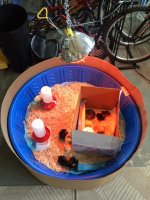I'm tired...it's way past my bed time.
I'll see if I can explain to you tomorrow why it doesn't matter what % the Corid package says..I'll butcher it right now if I try.
I'll see if I can explain to you tomorrow why it doesn't matter what % the Corid package says..I'll butcher it right now if I try.




 and I'll probably have to get up on time to pick up those new chicks tomorrow!
and I'll probably have to get up on time to pick up those new chicks tomorrow!  That's ok, you don't need to explain tomorrow, I believe you
That's ok, you don't need to explain tomorrow, I believe you 


 I had changed their pine shavings only about 2 hours before so there wasn't too much poop in them, but if there was any poop in the shavings that would mean that the new chicks would be exposed if the one chick has coccidiosis
I had changed their pine shavings only about 2 hours before so there wasn't too much poop in them, but if there was any poop in the shavings that would mean that the new chicks would be exposed if the one chick has coccidiosis 